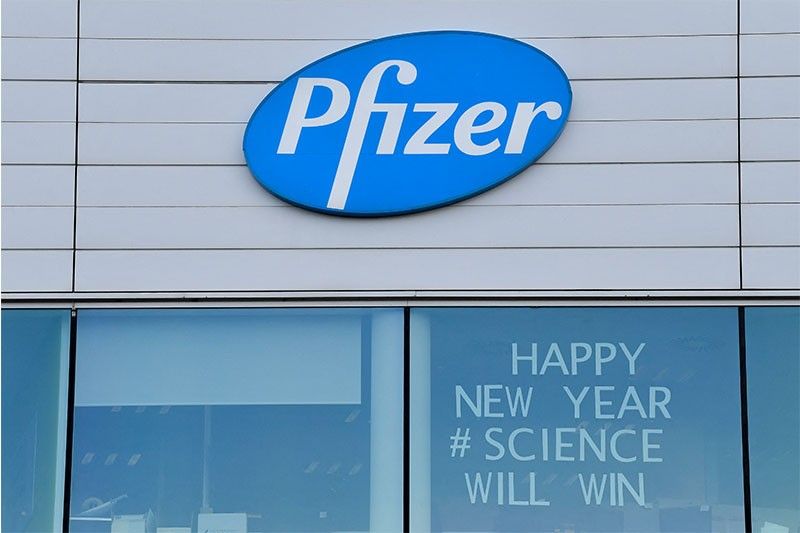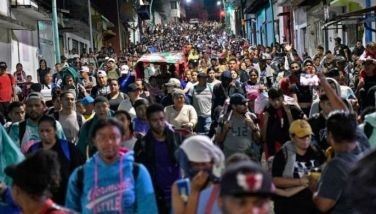EU approves first COVID-19 jab for kids aged 5 and up

THE HAGUE, Netherlands — The EU's drug regulator cleared Pfizer's Covid-19 vaccine for use in children aged five to 11 on Thursday, the first jab to be authorised for a cohort where the virus is rapidly spreading.
Only a handful of countries had previously given the nod for coronavirus vaccinations in younger children, including the United States, Israel and Canada.
The move paves the way for the 27-nation EU to extend its vaccination campaign as it battles a spike in cases. Pfizer is currently authorised for people aged 12 and over in the bloc.
"I'm glad to tell you that Comirnaty from today has received approval for children five to 11 years of age," said Marco Cavaleri, head of vaccine strategy at the European Medicines Agency (EMA), using the vaccine's brand name.
Children in the new age bracket will get one third of the dose that older people receive — 10 microgrammes compared with 30 microgrammes — with two injections, three weeks apart.
"Essentially, it's a much lower dose," Cavaleri told an online public meeting.
The European Commission must now sign off on the approval, which is usually a formality that happens within days, so that member states can decide themselves if they will give kids the vaccine.
EU Health Commissioner Stella Kyriakides said the EMA "is clear the BioNTech/Pfizer vaccine is safe and effective for young children, and can offer them additional protection."
French Health Minister Olivier Veran however said that he had asked national health regulators to examine the issue before taking any decision on vaccinating children.
"This vaccination, if it is decided on in France, will not start before the beginning of 2022," Veran said.
'Rare in children'
Health authorities say children make up an increasing proportion of new cases and hospitalisations in Europe, which is back at the centre of the coronavirus pandemic.
Children are also considered key drivers of infections even when they themselves do not display symptoms.
The EMA said the vaccine was 90.7 percent effective in a study of nearly 2,000 children of that age.
Side effects were usually "mild or moderate" lasting a few days, and included pain in the injection site, tiredness, headache, muscle pain and chills.
The EMA "therefore concluded that the benefits of Comirnaty in children aged five to 11 outweigh the risks, particularly in those with conditions that increase the risk of severe Covid-19."
But the Pfizer jab's safety in children "will continue to be monitored closely".
"We know that severe Covid-19 and death remain quite rare in children, however disease of all severity occurs in all the paediatric ages," the EMA's Cavaleri said.
Children were also at risk of so-called "long Covid" symptoms dragging on for months after infection, and multisystem inflammatory syndrome, he added.
The EMA is separately reviewing Moderna's coronavirus vaccine for children aged six to 11 and expects to reach a decision in January.
The regulator has so far approved four vaccines for use for adults in the EU: Pfizer and Moderna, which use messenger RNA technology, and AstraZeneca and Johnson & Johnson, which use viral vector technology.
Pharma giants Sanofi and GSK said on July 29, 2020, that they have agreed to supply Britain with up to 60 million doses of a potential COVID-19 vaccine. The agreement covers a vaccine candidate developed by France's Sanofi in partnership with the UK's GSK and is subject to a "final contract."
This thread collects some of the major developments in the search for a vaccine to ease the new coronavirus pandemic. (Main photo by AFP/Joel Saget)
As negotiations towards a new pandemic treaty pick up pace, observers warn of watered-down efforts to ensure equitable access to the medical products needed to battle future Covid-like threats.
Shaken by the pandemic, the World Health Organization's 194 member states are negotiating an international accord aimed at ensuring countries are better equipped to deal with the next catastrophe, or even prevent it altogether.
The process is still in the early stages, with the aim of reaching an agreement by May 2024.
But critics warn that revisions being made to the preliminary negotiating text are weakening the language -- notably in a key area aimed at preventing the rampant inequity seen in access to vaccines and other medical products during the Covid pandemic.
"I think it is a real step backwards," Suerie Moon, co-director of the Global Health Centre at the Geneva Graduate Institute, told AFP. — AFP
Africa's first mRNA vaccine hub is ceremonially launched on Thursday to acclaim from the UN's global health chief, who hailed it as a historic shift to help poor countries gain access to life-saving jabs.
The facility was set up in the South African city of Cape Town in 2021 on the back of the success of revolutionary anti-Covid vaccines introduced by Pfizer/BioNTech and Moderna.
"This precious project... will bring a paradigm shift in addressing the serious problem we faced, the equity problem, during the pandemic, so (that) it's not repeated again," World Health Organization (WHO) head Tedros Adhanom Ghebreyesus tells a media briefing to mark the inauguration. — AFP
China has approved its first locally developed messenger RNA (mRNA) vaccine against Covid-19, its manufacturer said Wednesday, months after the relaxation of strict Covid-zero regulations sparked a surge in cases.
The vaccine, developed by CSPC Pharmaceutical Group Ltd, has been approved for "emergency use" by Beijing's health regulator, the company said in a statement.
It showed high efficacy in a trial in which it was used as a booster shot for people who have been given other types of vaccines, the company added, without offering further details. — AFP
COVID-19 vaccine maker Novavax raises doubts about its ability to continue its business, announcing plans to cut spending after struggles in rolling out its coronavirus jab.
Shares of Novavax plummeted 25 percent in extended trading, after the company reported fourth-quarter earnings that missed analyst estimates.
While the firm should have enough money to fund operations, the situation is "subject to significant uncertainty," it says in a statement. — AFP
The protection against Covid-19 from being previously infected lasts at least as long as that offered by vaccination, one of the largest studies conducted on the subject says.
Ten months after getting Covid, people still had an 88% lower risk of reinfection, hospitalisation and death, according to the study published in the Lancet journal.
That makes this natural immunity "at least as durable, if not more so" than two doses of Pfizer or Moderna's vaccines, the study says.
The authors nevertheless emphasized that their findings should not discourage vaccination, which remains the safest way to get immunity. — AFP
- Latest
- Trending


































